Unit1 what's the matter 教材语法解析
- 格式:docx
- 大小:14.67 KB
- 文档页数:4
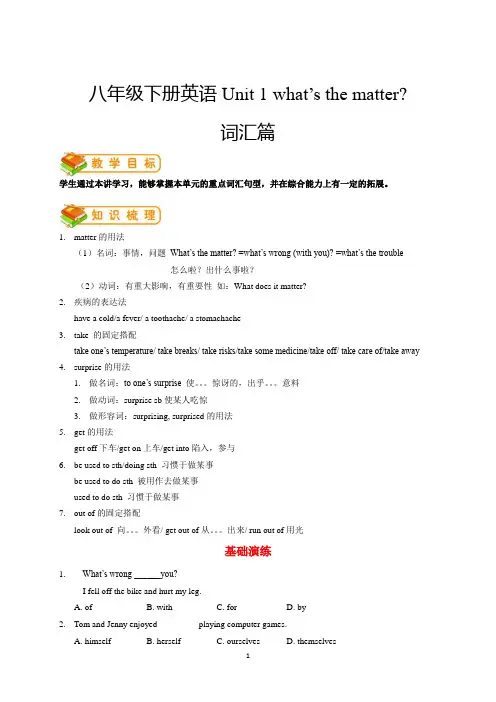
八年级下册英语Unit 1 what’s the matter?词汇篇学生通过本讲学习,能够掌握本单元的重点词汇句型,并在综合能力上有一定的拓展。
1.matter的用法(1)名词:事情,问题What’s the matter? =what’s wrong (with you)? =what’s the trouble怎么啦?出什么事啦?(2)动词:有重大影响,有重要性如:What does it matter?2.疾病的表达法have a cold/a fever/ a toothache/ a stomachache3.take 的固定搭配take one’s temperature/ take breaks/ take risks/take some medicine/take off/ take care of/take away 4.surprise的用法1.做名词:to one’s surprise 使。
惊讶的,出乎。
意料2.做动词:surprise sb使某人吃惊3.做形容词:surprising, surprised的用法5.get的用法get off下车/get on上车/get into陷入,参与6.be used to sth/doing sth 习惯于做某事be used to do sth 被用作去做某事used to do sth 习惯于做某事7.out of的固定搭配look out of 向。
外看/ get out of从。
出来/ run out of用光基础演练1.---What’s wrong ______you?---I fell off the bike and hurt my leg.A. ofB. withC. forD. by2.Tom and Jenny enjoyed _________playing computer games.A. himselfB. herselfC. ourselvesD. themselves3. Sally became interested ___________science and wanted to be a scientist.A. forB. inC. throughD. at4. ---I had a __________.---You’d better go to see a dentist.A. headacheB. feverC. coldD. toothache5. I didn’t _________my temperature, but I knew I had a fever.A. giveB. setC. takeD. show二、根据汉语意思翻译句子。
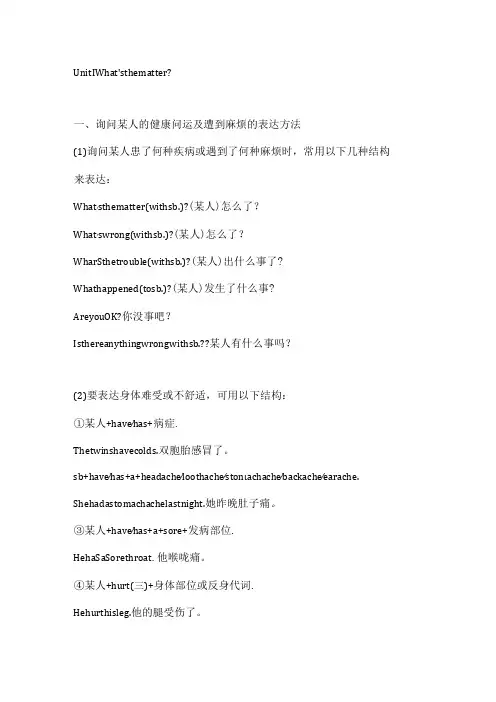
UnitIWhat'sthematter?一、询问某人的健康问运及遭到麻烦的表达方法(1)询问某人患了何种疾病或遇到了何种麻烦时,常用以下几种结构来表达:What,sthematter(withsb.)?(某人)怎么了?What,swrong(withsb.)?(某人)怎么了?WharSthetrouble(withsb.)?(某人)出什么事了?Whathappened(tosb.)?(某人)发生了什么事?AreyouOK?你没事吧?Isthereanythingwrongwithsb.??某人有什么事吗?(2)要表达身体难受或不舒适,可用以下结构:①某人+have∕has+病症.Thetwinshavecolds.双胞胎感冒了。
sb+have∕has+a+headache∕loothache∕stonιachache∕backache∕earache. Shehadastomachachelastnight.她昨晚肚子痛。
③某人+have∕has+a+sore+发病部位.HehaSaSorethroat.他喉咙痛。
④某人+hurt(三)+身体部位或反身代词.Hehurthisleg.他的腿受伤了。
⑤某部位+hurl(三).Myheadhurtsbadly.我头痛得厉害。
⑥某人+have∕has+apain+inone's+身体部位Ihaveapaininmychest.我胸口痛⑦(Thereis)soιnethingwrongwithone's+身体部位. Thereissomethingwrongwithmyrighteye.我的右眼有毛病。
⑧其他表达方式Shehasahearttrouble.她有心脏病。
Hegothitonthehead他头部受到了撞击。
Shecutherfinger.她割破手指了。
二、情态动词should的用法1.ShOIIld为情态动词,意为“应当:应当”,否定式为ShoUkIn'1,其后接动词原形,无人称和数的改变。
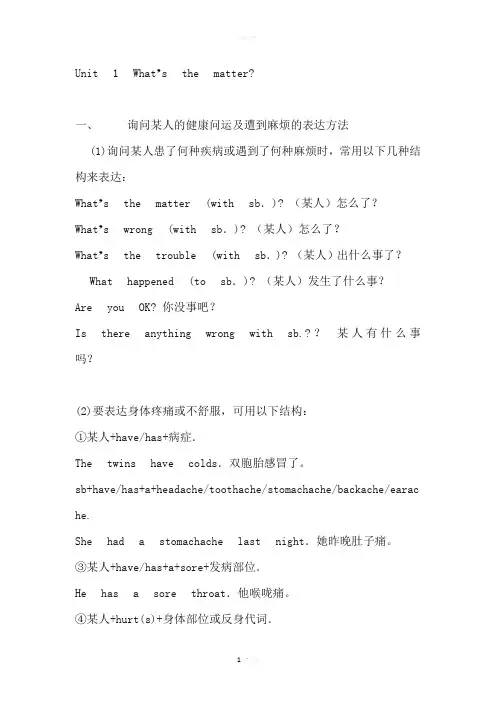
Unit1What’s the matter?一、询问某人的健康问运及遭到麻烦的表达方法(1)询问某人患了何种疾病或遇到了何种麻烦时,常用以下几种结构来表达:What’s the matter(with sb.)? (某人)怎么了?What’s wrong(with sb.)? (某人)怎么了?What’s the trouble(with sb.)? (某人)出什么事了?What happened(to sb.)? (某人)发生了什么事?Are you OK? 你没事吧?Is there anything wrong with sb.??某人有什么事吗?(2)要表达身体疼痛或不舒服,可用以下结构:①某人+have/has+病症.The twins have colds.双胞胎感冒了。
sb+have/has+a+headache/toothache/stomachache/backache/earac he.She had a stomachache last night.她昨晚肚子痛。
③某人+have/has+a+sore+发病部位.He has a sore throat.他喉咙痛。
④某人+hurt(s)+身体部位或反身代词.He hurt his leg.他的腿受伤了。
⑤某部位+hurt(s).My head hurts badly.我头痛得厉害。
⑥某人+have/has +a pain +in one’s+身体部位I have a pain in my chest.我胸口痛⑦(There is)something wrong with one’s+身体部位.There is something wrong with my right eye.我的右眼有毛病。
⑧其他表达方式She has a heart trouble.她有心脏病。
He got hit on the head他头部受到了撞击。
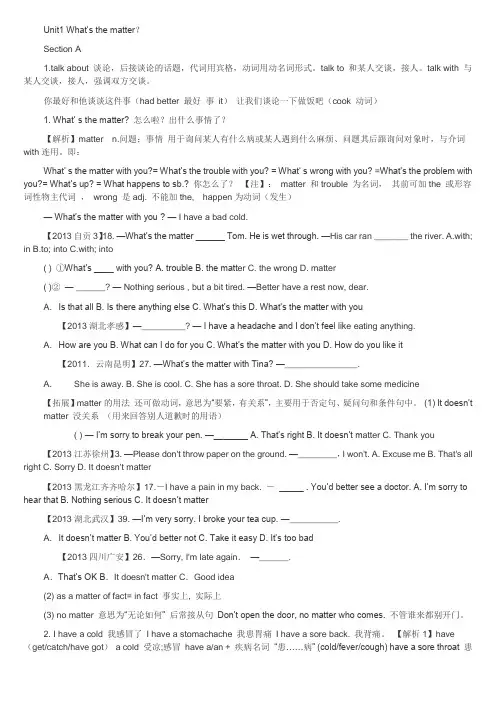
Unit1 What’s the matter?Section A1.talk about 谈论,后接谈论的话题,代词用宾格,动词用动名词形式。
talk to 和某人交谈,接人。
talk with 与某人交谈,接人,强调双方交谈。
你最好和他谈谈这件事(had better 最好事it)让我们谈论一下做饭吧(cook 动词)1. What’ s the matter? 怎么啦?出什么事情了?【解析】matter n.问题;事情用于询问某人有什么病或某人遇到什么麻烦、问题其后跟询问对象时,与介词with连用。
即:What’ s the matter with you?= What’s the trouble with you? = What’ s wrong with you? =What’s the problem with you?= What’s up? = What happens to sb.? 你怎么了?【注】:matter 和trouble 为名词,其前可加the 或形容词性物主代词,wrong 是adj. 不能加the, happen为动词(发生)—What’s the matter with you ? — I have a bad cold.【2013自贡3】18. —What’s the matter ______ Tom. He is wet through. —His car ran _______ the river. A.with; in B.to; into C.with; into( ) ①What’s ____ with you? A. trouble B. the matt er C. the wrong D. matter( )②— ______? — Nothing serious , but a bit tired. —Better have a rest now, dear.A. Is that allB. Is there anything elseC. What’s thisD. What’s the matter with you【2013湖北孝感】—_________? —I have a headache and I don’t feel lik e eating anything.A. How are youB. What can I do for youC. What’s the matter with youD. How do you like it【2011.云南昆明】27. —What’s the matter with Tina? —_______________.A. She is away.B. She is cool.C. She has a sore throat.D. She should take some medicine【拓展】matter的用法还可做动词,意思为―要紧,有关系‖,主要用于否定句、疑问句和条件句中。
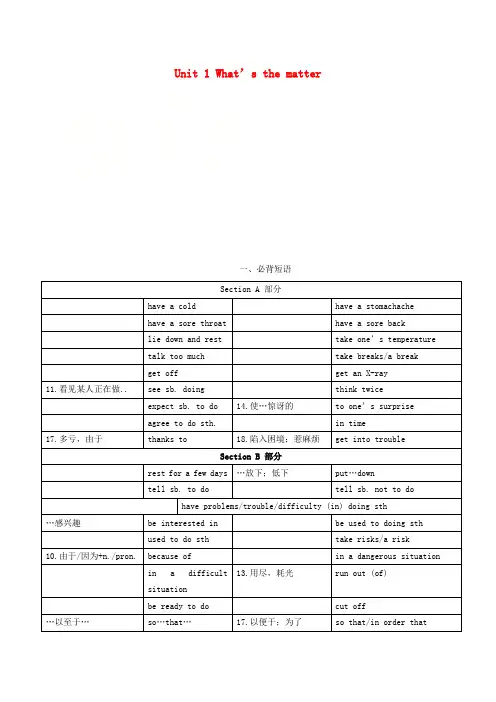
Unit 1 What’s the matter一、必背短语Section A 部分have a cold have a stomachachehave a sore throat have a sore backlie down and rest take one’s temperaturetalk too much take breaks/a breakget off get an X-ray11.看见某人正在做.. see sb. doing think twiceexpect sb. to do 14.使…惊讶的to one’s surpriseagree to do sth. in time17.多亏,由于thanks to 18.陷入困境;惹麻烦get into troubleSection B 部分rest for a few days …放下;低下p ut…downtell sb. to do tell sb. not to dohave problems/trouble/difficulty (in) doing sth…感兴趣be interested in be used to doing sthused to do sth take risks/a risk10.由于/因为+n./pron. because of in a dangerous situationin a difficult13.用尽,耗光run out (of)situationbe ready to do cut off…以至于…s o…that…17.以便于;为了so that/in order that【教材内容解析】Section A1.What’s the matter? (P. 1)What’s the matter意为“怎么了?出什么事了?”,常用来询问对方遇到什么麻烦或者有什么不顺心的事,后接with sb./sth.表示“某人/某物怎么了”。
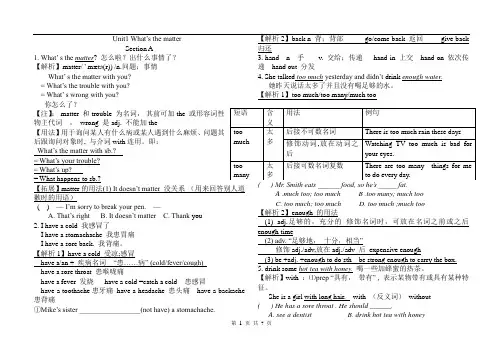
Unit1 What’s the matterSection A1. What’ s the matter? 怎么啦?出什么事情了?【解析】matter/ ' mætə(r)) /n.问题;事情What’ s the matter with you?= What’s the trouble with you?= What’ s wrong with you?你怎么了?【注】:matter 和trouble 为名词,其前可加the 或形容词性物主代词,wrong 是adj. 不能加the【用法】用于询问某人有什么病或某人遇到什么麻烦、问题其后跟询问对象时, 与介词with连用。
即:What’s the matter with sb.?= What’s your trouble?= What’s up?= What happens to sb.?【拓展】matter的用法(1) It doesn’t matter 没关系(用来回答别人道歉时的用语)( ) —I’m sorry to break your pen. —_______A. That’s rightB. It doesn’t matterC. Thank you2. I have a cold 我感冒了I have a stomachache 我患胃痛I have a sore back. 我背痛。
【解析1】have a cold 受凉;感冒have a/an + 疾病名词“患……病” (cold/fever/cough)have a sore throat 患喉咙痛have a fever 发烧have a cold =catch a cold 患感冒have a toothache患牙痛have a headache 患头痛have a backache 患背痛①Mike’s sister _________________(not have) a stomachache.【解析2】back n 背;背部go/come back 返回give back 归还3.hand n 手v. 交给;传递hand in 上交hand on 依次传递hand out 分发4. She talked too much yesterday and didn’t drink enough water.她昨天说话太多了并且没有喝足够的水。
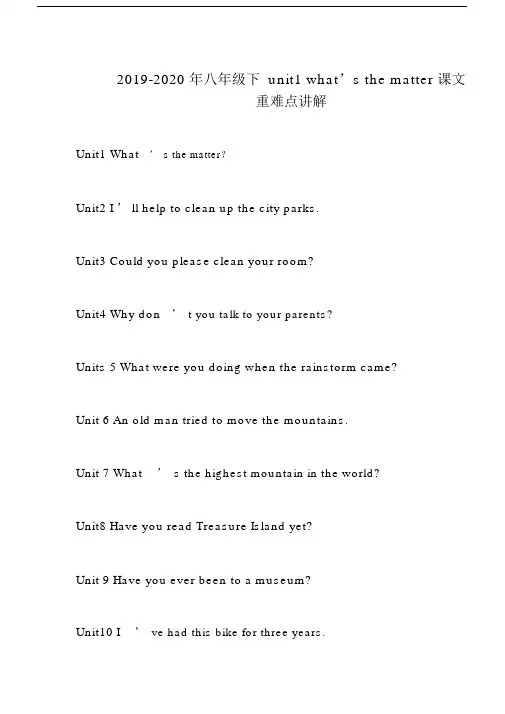
2019-2020 年八年级下 unit1 what’s the matter课文重难点讲解Unit1 What’ s the matter?Unit2 I ’ ll help to clean up the city parks.Unit3 Could you please clean your room?Unit4 Why don’ t you talk to your parents?Units 5 What were you doing when the rainstorm came?Unit 6 An old man tried to move the mountains.Unit 7 What’ s the highest mountain in the world?Unit8 Have you read Treasure Island yet?Unit 9 Have you ever been to a museum?Unit10 I’ ve had this bike for three years.Unit1 What ’ s the matter?Section A1.What ’ s thematter? 怎么啦?出什么事情了?【解析】 matter/ ' m?t ?(r)) /n. 问题;事情=What’ s the trouble with you?=What’ s wrong with you?你怎么了?【注】: matter 和 trouble 为名词,其前可加the或形容词性物主代词,wrong 是 adj. 不能加 the【2013 自贡 3】 18. — What ’s the matter ______ Tom. He is wet through.—His car ran _______ the river.A.with; inB.to; intoC.with; into【用法】用于询问某人有什么病或某人遇到什么麻烦、问题其后跟询问对象时,与介词 with 连用。
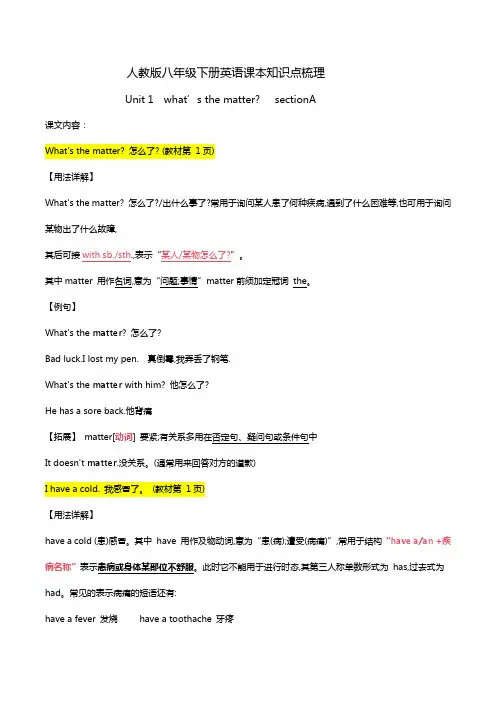
人教版八年级下册英语课本知识点梳理Unit 1 wh at’s the matter? sectionA课文内容:What's the matter? 怎么了? (教材第1页)【用法详解】What's the matter? 怎么了?/出什么事了?常用于询问某人患了何种疾病,遇到了什么困难等,也可用于询问某物出了什么故障,其后可接with sb./sth.,表示“某人/某物怎么了?”。
其中matter 用作名词,意为“问题;事情”matter前须加定冠词the。
【例句】What's the matter? 怎么了?Bad luck.I lost my pen. 真倒霉,我弄丢了钢笔.What's the matter with him? 他怎么了?He has a sore back.他背痛【拓展】matter[动词] 要紧;有关系多用在否定句、疑问句或条件句中It doesn't matter.没关系。
(通常用来回答对方的道歉)I have a cold. 我感冒了。
(教材第1页)【用法详解】have a cold (患)感冒。
其中have 用作及物动词,意为“患(病);遭受(病痛)”,常用于结构“have a/an +疾病名称”表示患病或身体某部位不舒服。
此时它不能用于进行时态,其第三人称单数形式为has,过去式为had。
常见的表示病痛的短语还有:have a fever 发烧have a toothache 牙疼have a headache头痛have a cough 咳嗽have a stomachache胃痛Do you often have a cold? 你经常感冒吗?Jim had a stomachache after supper yesterday.吉姆昨天晚饭后胃痛。
l have a stomachache.我胃痛。
( 教材第1 页)【用法详解】stomachache [名词]胃痛;腹痛是由“名词stomach(;腹部)+ache(疼痛)”构成的复合名词。
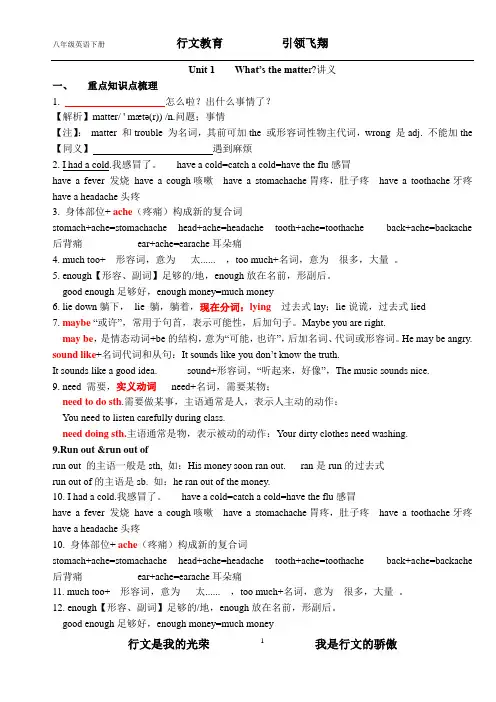
Unit 1 What’s the matte r?讲义一、重点知识点梳理1. 怎么啦?出什么事情了?【解析】matter/ ' mætə(r)) /n.问题;事情【注】:matter 和trouble 为名词,其前可加the 或形容词性物主代词,wrong 是adj. 不能加the 【同义】遇到麻烦2. I had a cold.我感冒了。
have a cold=catch a cold=have the flu感冒have a fever 发烧have a cough咳嗽have a stomachache胃疼,肚子疼have a toothache牙疼have a headache头疼3. 身体部位+ ache(疼痛)构成新的复合词stomach+ache=stomachache head+ache=headache tooth+ache=toothache back+ache=backache 后背痛ear+ache=earache耳朵痛4. much too+ 形容词,意为太...... ,too much+名词,意为很多,大量。
5. enough【形容、副词】足够的/地,enough放在名前,形副后。
good enough足够好,enough money=much money6. lie down躺下,lie 躺,躺着,现在分词:lying过去式lay;lie说谎,过去式lied7. maybe“或许”,常用于句首,表示可能性,后加句子。
Maybe you are right.may be,是情态动词+be的结构,意为“可能,也许”,后加名词、代词或形容词。
He may be angry. sound like+名词代词和从句:It sounds like you don’t know the truth.It sounds like a good idea. sound+形容词,“听起来,好像”,The music sounds nice.9. need 需要,实义动词need+名词,需要某物;need to do sth.需要做某事,主语通常是人,表示人主动的动作:You need to listen carefully during class.need doing sth.主语通常是物,表示被动的动作:Your dirty clothes need washing.9.Run out &run out ofrun out 的主语一般是sth, 如:His money soon ran out. ran是run的过去式run out of的主语是sb. 如:he ran out of the money.10. I had a cold.我感冒了。
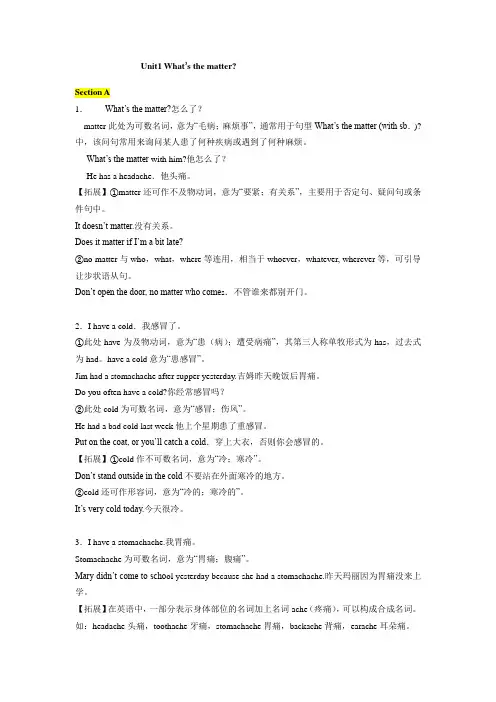
Unit1 What’s the matter?Section A1.What‘s the matter?怎么了?matter此处为可数名词,意为―毛病;麻烦事‖,通常用于句型What‘s the matter (with sb.)?中,该问句常用来询问某人患了何种疾病或遇到了何种麻烦。
-What‘s the matter with him?他怎么了?-He has a headache.他头痛。
【拓展】①matter还可作不及物动词,意为―要紧;有关系‖,主要用于否定句、疑问句或条件句中。
It doesn‘t matter.没有关系。
Does it matter if I‘m a bit late?②no matter与who,what,where等连用,相当于whoever,whatever, wherever等,可引导让步状语从句。
Don‘t open the door, no matter who comes.不管谁来都别开门。
2.I have a cold.我感冒了。
①此处have为及物动词,意为―患(病);遭受病痛‖,其第三人称单牧形式为has,过去式为had。
have a cold意为―患感冒‖。
Jim had a stomachache after supper yesterday.吉姆昨天晚饭后胃痛。
Do you often have a cold?你经常感冒吗?②此处cold为可数名词,意为―感冒;伤风‖。
He had a bad cold last week他上个星期患了重感冒。
Put o n the coat, or you‘ll catch a cold.穿上大衣,否则你会感冒的。
【拓展】①cold作不可数名词,意为―冷;寒冷‖。
Don‘t stand outside in the cold不要站在外面寒冷的地方。
②cold还可作形容词,意为―冷的;寒冷的‖。
It‘s very cold today.今天很冷。
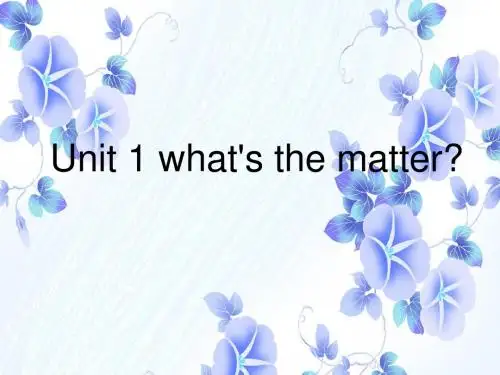
Unit1 What's the matter?第一节:重点短语1.患感冒have a cold2.胃痛have a stomachache3.喉咙痛 have a sore throat4.背痛have a sore back5.躺下休息lie down and rest6.量体温take one’s temperature7.说得太多talk too much8.休息take breaks/a break9.下车get off10.拍X光片get an X-ray11.看见某人正在做.. see sb. doing12.反复考虑think twice13.期待某人去做某事expect sb. to do14.使…惊讶的to one’s surprise15.同意做某事agree to do sth.16.及时in time17.多亏,由于thanks to18.陷入困境;惹麻烦get into trouble19.休息几天rest for a few days20.把…放下;低下put…down21.告诉某人做某事tell sb. to do22.告诉某人不要去做tell sb. not to do 23.做某事有问题/麻烦/困难 have problems/trouble/difficulty (in) doing sth24.对…感兴趣be interested in25.习惯于做某事be used to doing sth26.过去常常做某事used to do sth27.冒险take risks/a risk28.由于/因为+n./pron. because of29.处于险境in a dangerous situation30.处于困境in a difficult situation31.用尽,耗光run out (of)32.准备/乐于做某事be ready to do33.切除cut off34.如此…以至于…so…that…35.以便于;为了so that/in order that36.离开;从..出来 get out of37.做决定make decisions/a decision38.掌控,管理be in control of 39….的重要性the importance of…40.放弃give up41.用绷带包扎put a bandage on…42.继续做某事keep on doing43.似乎/好像做某事seem to do随堂练习翻译下列句子1. --你怎么了?--我咳嗽嗓子疼。
Unit 1 What’s the matter?一单词语法1.询问某人患了何种疾病或遇到了什么麻烦What’s the matter (with sb )? =What’s the trouble ? =What’s wrong?=What’s up ?=What happened (to sb)某人怎么了?2.表达身体不舒服的几种方式: 以“我头疼”为例①I have a headache ② My head hurts③There is something wrong with my head.④ I have a pain in my head⑤ have a sore+身体部位=have a 身体部位+achehave a sore back=have a backache.3. lie,现在分词 lying ①v 躺,平躺过去式 lay ② v 撒谎过去式 lied③ n 谎话 tell lies撒谎4.rest v/n 休息 have a rest=take a rest5.hurt v 过去式 hurt 疼痛,受伤①身体部位+hurt 某部位疼②hurt +宾语使…受伤 hurt oneself使自己受伤6. hit v 过去式 hit 现在分词 hittingSb get hit on the head 某人头部受到撞击 get sunburned 晒伤7.right away=at once=in a minute =right now立刻马上8. trouble n / v :get into trouble 陷入麻烦 in trouble 在困境中make trouble惹麻烦9.sick 与 ill①sick+名词如:sick people 病人还有头晕的,恶心之意feel sick make sb sick 使某人感到不适②ill只能放在be动词后如: He is ill.10. be used to+ 名词/代词/doing to 是介词习惯于….11.run out of =use up 用完,用尽 (人作主语)run out用完(物作主语)例:I ran out of my money 我用完了我的钱My money ran out 我的钱用完了12.important adj 重要的 unimportant 不重要的importance n 重要性 the importance of ……的重要性13.decision n 决定决心 decide v make a decision 下决心,做决定make a decision to do=decide to do 决定做某事14.control n/v 控制 be in control of 掌管,管理He is control of his life 他掌管着他的生命。
Unit1 What’s the matter?1.①matter n.问题;事情v.要紧、有关系It doesn’t matter 没关系(用来回答别人道歉时的用语)②What’s the matter? = What’s the trouble ?=What’s the problem?= What’s up?= What’s wrong ?=What happened? 怎么啦?出什么事情了?③What’s the matter with sb.? = What’s the trouble with sb.?=What’s the problem with sb.?=What happened to sb.?= What’s wrong with sb. ?某人怎么啦?某人出什么事情了?2.have a sore throat 喉咙痛have a sore back=have a backache背痛have a fever 发烧have a cold 感冒have a stomachache 胃痛have a toothache牙痛have a headache 头痛have the flu患流感3.back n. 背;背部adv.返回on one’s back在某人背上go/come back 返回give back 归还4.hand n 手v.交给;传递hand in hand 手拉手hand in 上交hand out 分发foot脚、足feet(复数)on foot=walk步行5. too many + 可数名词复数太多too much +不可数名词太多much too +形容词/副词太…6.enough“足够的,充分的”,放在名词之前,形容词、副词的后面。
enough to do足够做某事7.lie→lied→l ying说谎lie→lay→l ying躺lie down躺下、平躺tell a lie=tell lies说谎8.have/take a rest/break=take breaks休息9. get an x- ray照x光see a dentist = go to a/the dentist看牙医see a doctor = go to a/the doctor 看医生take medicine=have medicine吃药teeth cleaning洗牙10.weekday 工作日(指从星期一到星期五) weekend 周末(指星期六和星期天)on weekends = on the weekend在周末on weekdays 在工作日11.should “应该” 情态动词,后跟动词原形,否定:should not =shouldn’t 不应该一般疑问句:把should提到句首。
Unit1What’s the matter知识点Section A1.What’s the matter?怎么啦?出什么事情了?【解析】matter n.问题;事情What’s the matter with you?=What’s the trouble with you?=What’s wrong with you?【注】:matter和trouble为名词,其前可加the或形容词性y物主代词,wrong是adj.不能加the【用法】用于询问某人有什么病或某人遇到什么麻烦、问题其后跟询问对象时,与介词with连用。
即:What’s the matter with sb.?=What’s your trouble?=What’s up?=What happened to sb.?【拓展】matter的用法(1)It doesn’t matter没关系(用来回答别人道歉时的用语)()—I’m sorry to break your pen.—_______ A.That’s right B.It doesn’t matter C.Thank you 答案:B(2)as a matter of fact=in fact事实上,实际上2.I have a cold我感冒了I have a stomachache我患胃痛I have a sore back.我背痛。
【解析】have a cold受凉;感冒have a/an+疾病名词“患……病”(cold/fever/cough)have a sore throat患喉咙痛have a sore back患背痛have a fever发烧have a cold=catch a cold患感冒have a stomachache患胃痛have a toothache患牙痛have a headache患头痛have a backache患背痛①Mike’s sister_________________(not have)a stomachache.答案:doesn't have3.hand n.手hand in hand手拉手V.交给;传递hand in上交hand on依次传递hand out分发4.She talked too much yesterday and didn’t drink enough water.她昨天说话太多了并且没有喝足够的水。
Unit 1 What’s the matte r?一、基础知识1. What’ s the matter?怎么啦?出什么事情了?【解析】matter/ ' mætə(r)) /n.问题;事情What’ s the matter with you?= What’s the trouble with you? = What’s the problem with you?=What’ s wrong with you? 你怎么了?【注】:matter 和trouble 为名词,其前可加the 或形容词性物主代词,wrong 是adj. 不能加the【使用办法】用于问询某人有什么病或某人碰到什么麻烦、问题其后跟问询对象时,与介词with连用。
即:What’s the matter with sb.? = What’s your trouble? = What’s up? = What happens to sb.?—What’s the matter with you ?— I have a bad cold.2. I had a cold.我感冒了。
have a cold=catch a cold=have the flu感冒have a fever 发热have a cough咳嗽have a stomachache胃疼,肚子疼have a toothache牙疼have a headache头疼3. 身体部位+ ache(疼痛)构成新旳复合词stomach+ache=stomachache head+ache=headache tooth+ache=toothache back+ache=backache后背痛ear+ache=earache耳朵痛4. much too+ 形容词,意为太...... ,too much+名词,意为诸多,大量。
5. enough【形容、副词】足够旳/地,enough放在名前,形副后。
Unit 1 What’s the matter?
一、询问某人的健康问运及遭到麻烦的表达方法
(1)询问某人患了何种疾病或遇到了何种麻烦时,常用以下几种结构来表达:
What’s the matter (with sb.)? (某人)怎么了?
What’s wrong (with sb.)? (某人)怎么了?
What’s the trouble (with sb.)? (某人)出什么事了?
What happened (to sb.)? (某人)发生了什么事?
Are you OK? 你没事吧?
Is there anything wrong with sb.??某人有什么事吗?
(2)要表达身体疼痛或不舒服,可用以下结构:
①某人+have/has+病症.
The twins have colds.双胞胎感冒了。
sb+have/has+a+headache/toothache/stomachache/backache/e arache.
She had a stomachache last night.她昨晚肚子痛。
③某人+have/has+a+sore+发病部位.
He has a sore throat.他喉咙痛。
④某人+hurt(s)+身体部位或反身代词.
He hurt his leg.他的腿受伤了。
⑤某部位+hurt(s).
My head hurts badly.我头痛得厉害。
⑥某人+have/has +a pain +in one’s+身体部位
I have a pain in my chest.我胸口痛
⑦(There is)something wrong with one’s+身体部位.
There is something wrong with my right eye.
我的右眼有毛病。
⑧其他表达方式
She has a heart trouble.她有心脏病。
He got hit on the head他头部受到了撞击。
She cut her finger.她割破手指了。
二、情态动词should的用法
1.Should为情态动词,意为“应该;应当”,否定式为shouldn’t,其后接动词原形,无人称和数的变化。
常用来表示征询意见、建议、劝告、要求或义务等。
You should drink hot water with honey.
你应该喝加有蜂蜜的开水。
He should put his head back.
他应该把头后仰。
We should try our best to help him.
我们应当尽力去帮助他。
You shouldn’t watch TV.
你不应该看电视。
2.Should用于主语为第一人称的疑问句,表示征询意见。
Should I put some medicine on it?
我应当给它敷上药吗?
Should we tell her about it?
我们应该告诉她这件事吗?
【拓展】
在英语中,表示建议的说法有很多,而且都是中考考查的重点。
主要结构有:
Would you like (to do) sth.?
你想要/愿意(做)某事吗?
Would you like to play basketball with me?
你想要和我一起打篮球吗?
Shall I/we do sth?
我/我们做…好吗?
Shall we go to the zoo tomorrow?
明天我们去动物园,好吗?
Why not do sth ?
为什么不…呢?
Why not join us?
为什么不加入到我们当中来呢?How/What about doing sth ?
做某事怎么样?
How about going swimming?
去游泳怎么样?
Let’s do sth
让我们做….吧。
Let’s go home.
咱们回家吧。
You’d better (not) do sth
你最好(不)要做某事。
You’d better not go there alone.你最好不要一个人去那儿。